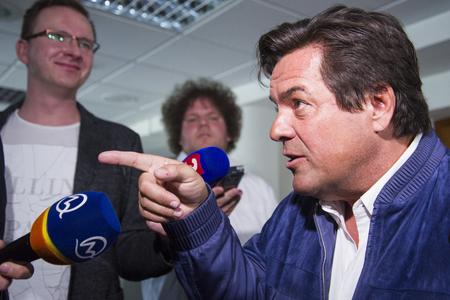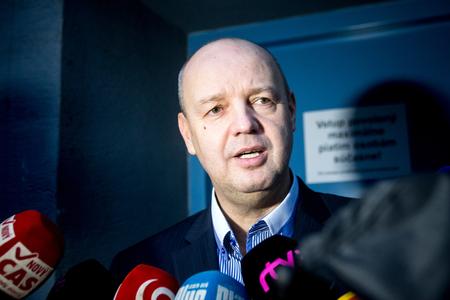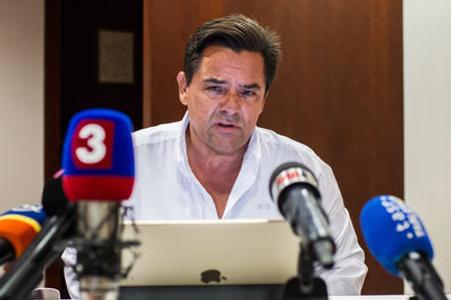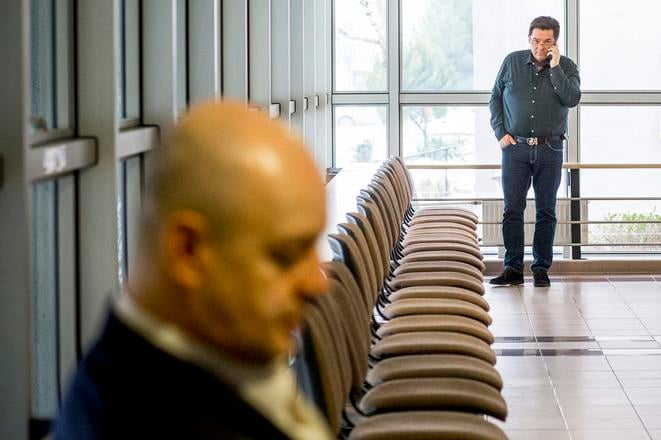A businessman and a former politician/TV CEO, prosecuted for allegedly forging promissory notes, have been released from custody despite the opposing opinion of the prosecutor.
Prominent businessman Marian Kočner and former TV Markíza director and former economy minister Pavol Rusko will not be held in custody while they are under prosecution, a judge from the Specialised Criminal Court (ŠTS) in Banská Bystrica decided late on the night of June 23. The two are charged with forging promissory notes worth €70 million to the private TV channel Markíza.
“The court did not accept the reasons for keeping them in custody and released them. The Supreme Court will decide in this case on June 28 at 14:00,” said Rusko’s lawyer, Marek Para, adding that they will not provide any more details until the Supreme Court issues its ruling.
Neither of the accused commented on the verdict, although a prosecutor from the Special Prosecutor’s Office has filed a complaint against it.

“An STS judge stated that there is a reasonable suspicion that the two accused have committed the crime, however he found no particular reason to keep them in custody,” ŠTS spokesperson Katarína Kudjaková confirmed for the TASR newswire.
The ŠTS judge has been dealing with the case since June 23 when the police presented the two accused before the court in handcuffs.
The National Crime Agency (NAKA) arrested Kočner on June 20. Rusko arrived at the Police Presidium on June 21. Following his hearing, he left the building, later to be detained by the police. They both underwent a hearing before an investigator on June 21.
Prosecutor comments
The prosecutor Ján Šanta admitted, as quoted by the Sme daily, that the police do not have the originals of the notes. He also says that they can do without them. However, Šanta sees Kočner’s reluctance to come up with the originals and show them to investigators as one of the main reasons for custody.
“He has already hindered the criminal prosecution and will continue to do so with the unlawful interference with the promissory notes and by not disclosing where they are,” Šanta said, as cited by Sme. The prosecutor added that the businessman simply “will not react to their questions”.
He cited this as the main reason why he sided with police opinion and proposed to keep Kočner in pre-trial custody.

“The forgeries are not just a matter of directly signing or not signing,” Šanta further explained. “There are other circumstances in the case. It can be proven with witness testimonies, documents, accountancy and so on.”
Šanta added that the investigators lack the original notes only “for now”. He did not want to comment on whether the police actually carried out a house search at Kočner and Rusko’s residences.
Kočner’s detention
Kočner was detained June 20 but after being driven to the police presidium he claimed he felt sick and returned home, allegedly to fetch medicines. Then he returned to the police presidium but he may have interfered with the notes.
The promissory notes only surfaced in 2016 but they are dated as far back as the year 2000. Experts who have examined them have suggested that Rusko’s signature is different than on other documents from that time. They were approved, nevertheless, and Kočner received them back from the court one month ago.
Šanta has not ruled out that a new expert opinion could be sought. He added (before the release on June 23) that he is “deeply convinced” that there is enough evidence to charge Kočner and Rusko and to keep them in pre-trial custody.
What is the case about?
Originally, Kočner requested €69 million for four notes from TV Markíza as Rusko, then CEO of the private broadcaster, had signed the promissory notes but failed to repay them, arguing he had no assets to do so.
Kočner failed to pay court fees in one case and the final amount is now €42.8 million, according to Sme.

Judge Zuzana Maruniaková decided on the case without scrutinising the authenticity of the promissory notes, believing Rusko’s claim that he had signed them. TV Markíza claims they are fully fictitious and the two exchanged them just to exert money from them.
Asked whether investigators will now also check on the possible collusion between the courts and Kočner when acknowledging the claim to the money, Šanta did not answer directly, according to Sme.


 Pavol Rusko (front) and Marián Kočner (source: SME)
Pavol Rusko (front) and Marián Kočner (source: SME)